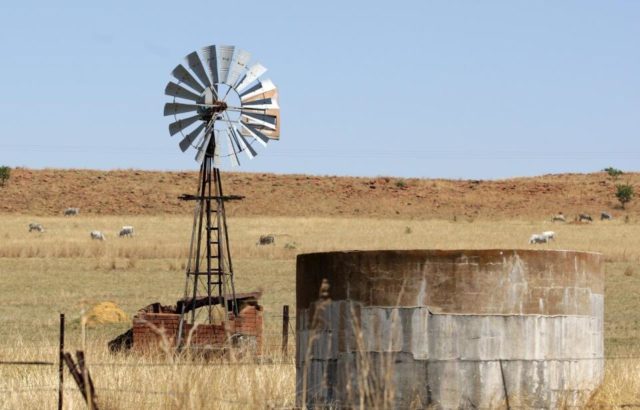The crippling six-year drought in the area has led to a reported 60 000 workers in farming and related activities losing their jobs
THE ONGOING drought in the Karoo and the devastating economic impact on the region has opened up the debate about economic alternatives, with hydraulic fracturing (fracking) on the table again.
According to the spokesperson for the Department of Mineral Resources, Ayanda Shezi, government is investigating the shale gas potential in the Karoo.
Shezi said the state was looking at the science of fracking and would also be considering water and environment-related issues before coming to any conclusion.
The crippling six-year drought in the area has led to a reported 60 000 workers in farming and related activities losing their jobs.
The search for alternative economic activities has drawn the debate about fracking into the mix but the government seems to be cautious about entering the debate. However, it said that three companies had been granted exploration permits for shale gas in the Karoo in terms of the Mineral and Petroleum Resources Development Act.
“No hydraulic fracturing or fracking has been authorised but holders are permitted to conduct some other forms of exploration, except for hydraulic fracturing/fracking, as the government is still investigating the use of this method,” Shezi said.
Lili Nupen, a director of the Nupen Staude de Vries law firm specialising in mining and environmental law, said: “In order for ‘fracking’ to be legally permissible in South Africa, the regulatory regime regulating fracking would need to be published in draft form by the correct competent authority for purposes of public comment by interested and affected parties, including farmers, landowners, mineral right holders in the area.”
She added: “Shale gas is a hydrocarbon gas (form of natural gas) extracted from shale rock formations, a type of sedimentary rock found in large quantities in the Karoo.
“Fracking describes the process applied in the extraction of shale gas, which involves using a highly pressured mixture of water and chemicals to drill into shale in order to release gas trapped in the rock.”
Tiaan Theron, who farms between Beaufort West and Rietbron, will be directly affected if fracking is allowed.
He said: “I know there are arguments that the drought is putting a halt to the economy of the area and that we have to look at alternatives. However, for the past 100 years and more sheep farming has been the main source of income for the majority of people in this region and it’s the backbone of the economy.”
Theron said he still believed sheep farming was viable, as the drought was cyclical: “We still believe that small animal farming is still the best long-term and sustainable economic activity that will provide for the people in the Karoo, and we hope and have faith that we’ll get rain in 2020.
“We hope fracking won’t happen, because we have no alternative source of water. If this water is contaminated, it will mean life in this part of the region will for all practical reasons come to a standstill,” said Theron.
The provincial chairperson of the EFF, Melikhaya Xego, said: “It’s not in dispute that fracking of shale gas will create and bring about many job opportunities and change the lives of many for the better, more especially in the Karoo region. Such a venture will also boost the economy by having a positive impact on the country’s GDP in the long term.”
The Freedom Front Plus (FF+) this week said that it was “deeply concerned” that the Department of Minerals and Energy was apparently determined to extract shale gas in the Karoo, regardless of the disadvantages.
“This is the only conclusion that can be drawn from recent media reports and the answer to a written question by the FF+,” FF+ spokesperson Dr Wynand Boshoff said.
“On the 4th of July 2019, the Supreme Court of Appeal brought an end to all prospecting with the intention of shale gas extraction by setting aside the regulations according to which it was being done. Soon after, on the 10th of July, the Minister of Minerals and Energy, Mr Gwede Mantashe, announced that shale gas was indeed going to be extracted, but simply by making use of other methods,” he added.
Boshoff stated that the FF+ asked the minister in a written question to reveal more details about these other methods and he responded by saying that the research is still being conducted.
“This question was signed on October 15, but on October 21, a media report stated that three companies were granted rights for shale gas exploration in the Karoo. In the report reference is made to the paralysing drought that has had the Karoo in its grip for the past six years. According to the report, the department sees shale gas exploration as a way to create economic alternatives in the semi-desert region,” Boshoff said.
He added that the FF+ found it “incomprehensible” that the department is bent on extracting shale gas while the region is actually ideal for generating solar power (photovoltaic energy). “It is a technology that requires no extra water, does not pollute the environment and is permanently reconcilable with established livestock farming. If Karoo residents are wondering what Minister Mantashe has up his sleeve, they are justified,” Boshoff concluded.








